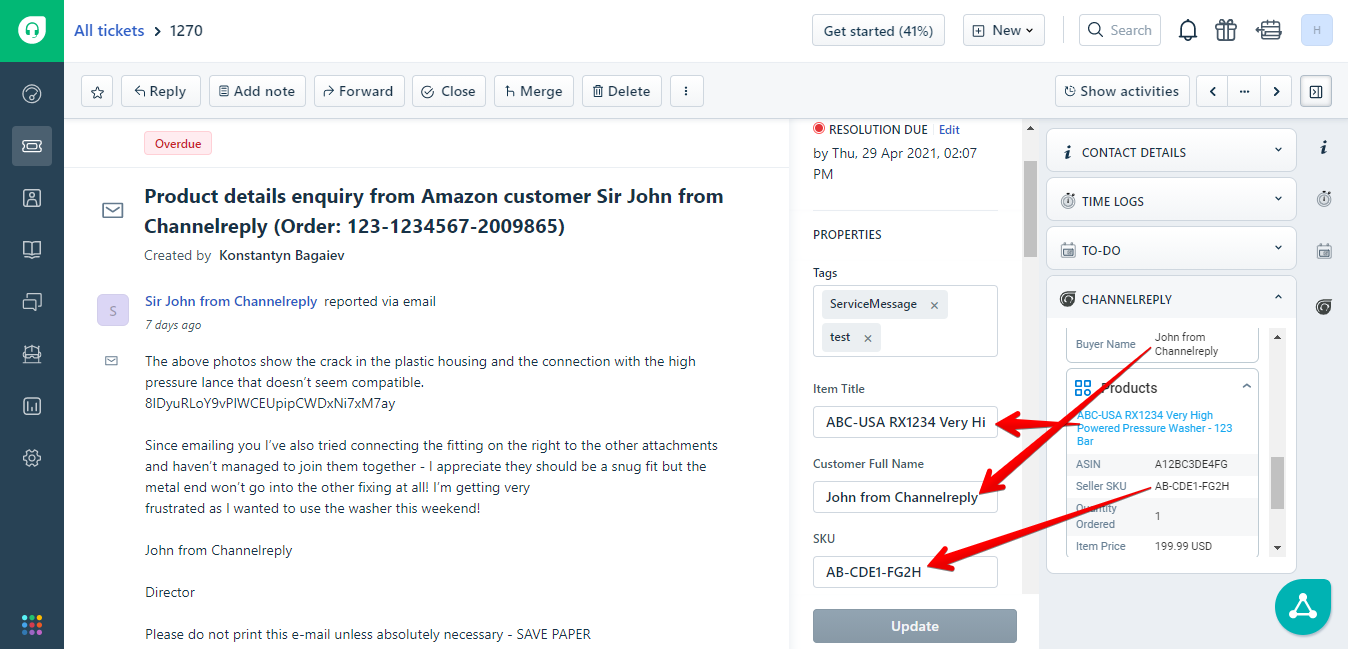Customer service skills are vital for anyone who is working in a customer-facing role, or a role that has contact with customers. Dealing with customers and clients is necessary for the success of all businesses, but anyone who has been in the world of work for any amount of time knows that it often isn’t easy, even when the company is having a “good” day.
Those customer service skills really come into play when something has gone wrong with the customer’s purchase, if the company has unintentionally provided a poor experience, or if the customer is annoyed or even—in the worst-case scenario—threatening to take further action. The ability to deal with customers in this type of situation is a real gift—but there are also some skills that can be honed with time and a bit of practice.
Outstanding customer service skills aren’t just essential for keeping your customers happy, either. If the business is to thrive, both management and team members need to have customer service skills. Those skills provide real value to your customers, which add up to monetary value for your business, providing return on your investment in your staff.
But what, exactly, makes up a great customer service professional, and what traits do they have that make them a great person to deal with the public? Luckily, most of the skills that we will talk about in this post can be acquired on the job, and the ability to use them can be honed over time. With that in mind, let’s take a look at the skills that you’ll need if you’re considering taking a customer-facing role, either online or in-store.
1. Patience and Composure

Patience, and the ability to remain calm when facing an upset customer, can be really, really tough. The phrase “the customer is always right” isn’t always correct, and in fact there are times when the exact opposite is true, and they are trying to use the phrase in their favor! The ability to hold your temper, even when the situation is a bit tense, is a valuable skill to have when you’re faced with an upset customer.
Of course, it isn’t always the upset customer who is in the store, and if other customers observe that you are doing your best to help someone who is upset or unreasonable, then they will empathize with you, and admire your resilience. They’ll probably share their experience and how well you dealt with it with their friends—and as you are probably already aware, good word of mouth is incredibly valuable for a business.
If you’re encountering customers remotely—by phone, email, or on your social media—staying calm and remaining patient is essential. Luckily, when you’re remote, and you’re answering emails, DMs, or live chats, you can take a moment to calm down and collect your thoughts before responding, and even get a second opinion from a colleague before you send the reply. Remember, any replies that you send may be screenshotted and used on a post about your company—so choose those words wisely.
You can work on developing your patience and composure by watching training videos and working with colleagues on role-playing exercises, escalating exercises in ways that could occur, and then discussing how the situation could be applied to the business that you’re working in. It won’t prepare you for every situation you might encounter, but it will certainly help.
2. Communication

Miscommunication is the cause of so many issues in relationships—both personal and professional. Listening to your customers to understand them properly, and ensuring you understand by repeating back their issue in your own words, is just one strategy. It goes both ways, though, and ensuring that your customers really understand what it is that you’re telling them will prevent a lot of issues in the future.
When you’re answering customers remotely via email, DMs, and live chat, then it is usually easier to understand what the customer is asking, but that isn’t always the case. Replying to ask further questions is a good place to start, and if there is a concept that you’re explaining to a customer that is easier to understand in person, then know when it is best to include a link to a video. You might also record a short video to put into your reply, or you might call the customer to allow them to ask further questions more efficiently than going back and forth by email.
3. Ability to Read Non-verbal Cues

It isn’t all about the words and tone of voice your customers are using when it comes to understanding the reason they have approached you—body language is equally as important. Sometimes, you’ll be able to tell that a customer is upset from their demeanor before they approach you and explode with all their angry words!
Even more important are the customers that are more reserved. They might hold back with their choice of language and tone, but you’ll be able to tell from their nonverbal cues—their body language—that they are frustrated. For these customers, being able to acknowledge that you understand that they are unhappy still, and to invite them to tell you more information, will go a long way—which feeds into our next skill, empathy.
Non-verbal cues are less important when you’re dealing with customers online, outside the occasional video call, but being able to read between the lines is a valuable thing too. This can be developed in time, but reading reviews is a good place to practice.
4. Empathy

Understanding the needs of your customers is absolutely essential to providing great customer service. Listening carefully and putting yourself into their shoes is the key here, even if you deal with customers who are seemingly similar week in, week out. The understanding that you can get from this means that you can provide the service they need most effectively. The customer feeling seen, heard, and understood is an integral part of whether they leave your business feeling satisfied or not, and whether they are likely to return to you in the future as a repeat customer.
5. Positive Language

Being able to put a positive spin on a situation that could be somewhat negative is a really valuable skill to have. Think about the difference that a customer will feel hearing each of these replies to their request:
“No, sorry, it is sold out.”
“That is a great product, and we sell so many. Unfortunately, we don’t have it in stock right now—let me check when we’re expecting more.”
On hearing the first reply, the customer is likely to leave the store to go elsewhere, and isn’t likely to return. With the second response, the customer’s choice is validated by both you and others thinking it is a good choice, and by telling them you can find out when they can return and get it from you, you’re showing that you care. Either way, they’re not going home with the product today—but they’re going to feel more positive about the business with the second answer.
Using positive language is a relatively simple concept to apply to online customer service, too—you just need to think about how to phrase your replies so that they are positive and polite, while remaining succinct and to the point.
6. Acting

The ability to keep a cheerful face when you feel anything but happy is definitely required when you’re dealing with customers in-person. It isn’t always easy to do, especially if you have a lot on your plate, but you need to think about the sort of person you like to encounter yourself, and “act as if” you’re that person.
Even more important is the ability to hold your tongue and act in a way that won’t antagonize a customer who is already wound up—even if they are being unreasonable and you’re ready to ask them to leave (especially if less-than-polite terms are springing to mind!).
The ability to “act as if” is just as critical on phone or video calls as it is in person. It’s less important if you only encounter your customers through text, but even then, you need to be able to project a cheerful tone in your replies.
7. Honesty

How often have you spoken to a representative and known they were making up answers to get rid of you? It happens more than it should, but part of great customer service is honesty. It is always better to be honest with customers—they might not like the answer they get, and service might be a little slower, but if they can see you’ve given them the right answer, and are trying your best, they will leave happier.
The biggest piece of advice we can impart here is that if you’re not sure about the answer to a question—tell them! Customers would rather know that straight up. Just tell them you’re not sure and want to get them the right answer, and to give you a moment while you get that for them, because they’ll appreciate that you did your best.
Online, you can prove your trustworthiness relatively easily too. If you’ve found the answer to their question on your website, or the product manufacturer’s website, then add the link to your reply. If it is taking a while to get the answer back by email from the manufacturer, send them an update, or even better, give them a call to apologize and let them know the situation. Knowing that you aren’t just ignoring their enquiry will mean they’re much happier, even if there is a delay.
8. Quick Thinking

Sometimes, you will end up dealing with a situation that is unlike any you’ve encountered before. In store, there are any number of scenarios that can play out, from children causing chaos to someone requiring medical assistance, and everything in between. Having guidelines for staff on how to deal with certain situations is the first step, but when something happens that is really unexpected, you simply have to be able to cope. This applies to online situations too, where you might need to reply to a live chat quickly and carefully to prevent a situation from escalating.
As with many of these skills, much of this comes with time and experience—although there are some situations that you simply won’t be ready for no matter how much training and practice you get.
9. Persuasiveness

There’s a real art to being able to persuade a customer that they have found the right product for them, without going in with the hard sell. Customers know when salespeople are trying to make a sale without caring what they really need, so taking the time to understand that—and the type of person they are—before making recommendations is well worth it.
While the ability to give the hard sell is a skill in itself, a gentler approach is much more valuable in most cases, since customers will speak highly of the business. This good word of mouth is even more essential where the business has local customers, since just one or two customers sharing a negative experience of the “hard sell” may drive other customers to shop elsewhere.
So, understand the customer’s pain points—the reasons they are buying the item—and then highlight the reasons that the product(s) they are considering are right for them. If they’re trying to choose from a number of products, then being able to help them to see the benefits of one over another (rather than the more expensive one) is an incredible skill to have.
10. Integrity

Serving customers is not always straightforward, and there isn’t always a manager available to escalate an issue to. When you’re helping a customer with something that has gone wrong, and the manager isn’t available, things can get tough. In these situations, you need to be able to make promises you can keep; otherwise, the customer is going to be left with an even more negative opinion of the business.
It is always better to under-promise and over-deliver in difficult situations. For example, you could promise only that the customer will hear from the manager the next morning, but make sure that when the manager calls, they have completely rectified the problem (such as by issuing the refund that wouldn’t go through the previous evening).
11. Ability to Go the Extra Mile

Many customers are easy to keep happy—efficient service (with a smile!) is often more than enough. But when a customer has a special request, or needs a little more assistance than average, then having the willingness to do that bit more will go a long way. Examples might include:
- Wrapping an item in some pretty tissue paper because it is to be a gift and the elderly customer has arthritis
- Going out of your way to phone a number of suppliers to source a product when it’s out of stock and the customer can’t find it online
- Completely resolving an issue where a customer has had a poor experience with the company, and then going out of your way to send a handwritten apology note by post, with a discount code included
These examples might only cost your company a matter of moments to achieve, but the difference they make to the customer’s experience is priceless—and will far exceed any kind of marketing activity.
12. Willingness to Learn and Adapt

You might not always get things right—and there are definitely situations where you’ll end up needing to change policies, procedures, and so on. Accepting that you aren’t always right, and being open to change where appropriate, will give your customers further trust in your business—because you’ll have shown them you deserve it. The increase in trust that this will afford you means that they are more likely to become repeat customers, speak well of your company, and maybe even become brand ambassadors.
In the online space, new opportunities present themselves regularly, and businesses must be prepared to learn how to capitalize on those chances. No longer is a website and a Facebook page enough. Being ready to learn the latest ecommerce functionality on social media, or even start a company account on a newer type of platform and make the most of it, is an incredibly valuable skill to have.
13. Attention to Detail

Nobody gets absolutely everything right, but providing the best service you can and being as thorough in your work as possible is essential for the success of the business. Preparing for the day so that shelves are full, pricing is correct, staff cover each area effectively, and everyone knows where more stock of bestselling items is kept means that you can focus on the customer better.
When your business is based online—especially in the ecommerce space—this means avoiding spelling errors and being swift and consistent with the service you provide for your customers. Luckily, there are plenty of tools that can help you to keep things as close to perfection as possible. Tools like Grammarly can help your team avoid embarrassing typos, while getting customer messages from all your sales channels in a single system using tools like ChannelReply can save you from letting anyone slip through the cracks.
Attention to detail is crucial for all businesses, but particularly retailers both online and offline. Incorrect pricing, spelling errors and so on make the business look unprofessional, and can damage the trust that customers might otherwise have had in the business. Damaged trust leads to fewer sales and poor reviews, which can be really, really hard to recover from in the longer term.
14. Product Knowledge
Knowing your product offering and being able to learn about new products in your inventory is essential. But customers generally don’t expect you to know absolutely everything about the product they are asking about immediately—even if you’ve been in business for a long time. This is where honesty comes in, because customers can tell if you’re giving them a half-truth or a guess—especially if you’re answering their question in person or on the phone. It is much better to admit you’re not sure, but that you can find out for them, and then take a few minutes to get them the right answer.
For customers whom you’re answering remotely, take a moment to look up the answer, either by searching online or by checking the manufacturer’s website or phoning them before you reply. Include any relevant links in your message so your customer will know you’ve done the relevant research too.
When you find out the answers to those awkward questions, save them somewhere in case the question comes up again. For online businesses, the best option is to save them in canned replies, like Zendesk macros or Freshdesk canned responses.
Above: Amazon data from ChannelReply in Freshdesk ticket fields. This data can be used in Freshdesk's canned responses to send personalized answers in two clicks.
Otherwise, you’ll know the right solution for your business—it could be as simple as a Word document, or you might add it to the product information on your inventory management system. If you find you’re getting similar questions regularly, update the product listing page and the FAQ page too.
Our Final Thoughts
The great thing about face-to-face customer service skills is that there are very few that require formal qualifications. Most customer service skills can be learnt on the job, and many simply make sense when you think about them. For businesses that serve their customers purely online, things are different, but they’re still essential to get right.
Whether you’re starting your career in customer service, you’re making a return to the field, or you’re starting your own business, you can’t go too far wrong if you treat customers the way you’d like to be treated.





